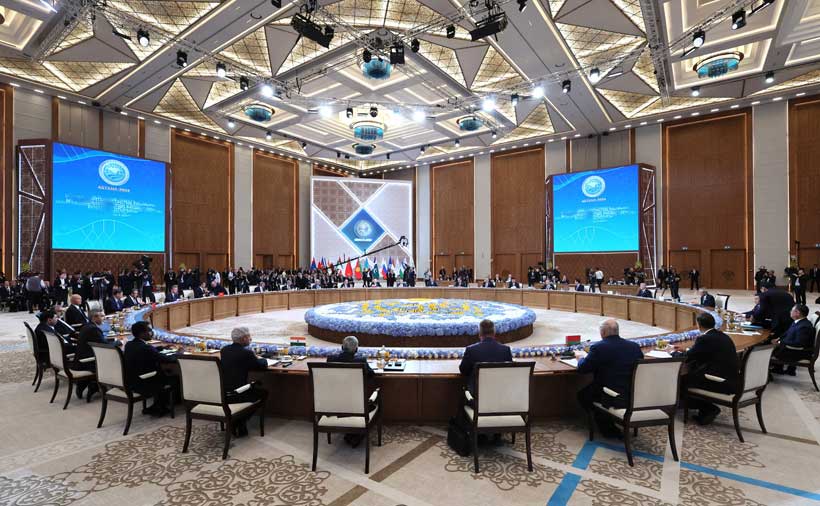The Shanghai Cooperation Organization (SCO) is a Eurasian political, economic, and security alliance. The upcoming Shanghai Cooperation Organization (SCO) summit in Islamabad offers Pakistan an unprecedented opportunity to redefine its role in the Global South and elevate its position on the global stage. As Pakistan prepares to host the event, it will not only be seen as a key player within the organization but will also be able to enhance its diplomatic identity, leverage its geographic and economic importance, and demonstrate its potential for leading regional cooperation.
Founded in 2001, the SCO comprises eight member states: China, Russia, India, Pakistan, and four Central Asian republics—Kazakhstan, Kyrgyzstan, Tajikistan, and Uzbekistan. It also includes four observer states (Afghanistan, Belarus, Iran, and Mongolia) and several dialogue partners. Given its focus on regional security, economic cooperation, and political coordination, the SCO’s growing relevance in global geopolitics aligns with Pakistan’s own foreign policy objectives. At a time when Pakistan is mired in economic and political crises, SCO summit provides an opportunity for Pakistan to introduce itself as a country that is capable of hosting and dealing with the global summits and issues respectively.
Historically, Pakistan has been a bridge between South and Central Asia due to its geographical positioning, and the SCO summit will reinforce this role. The organization’s focused areas resonate deeply with Pakistan – a country that has faced its share of internal and external security challenges. As the SCO continues to expand its role beyond security into areas of economic and infrastructural development, Pakistan has the potential to play a pivotal role, especially as an energy and trade corridor linking Central Asia to the Indian Ocean. The China-Pakistan Economic Corridor (CPEC) is a tangible manifestation of this connectivity, and the SCO summit can further amplify Pakistan’s role in regional trade and commerce.
The Global South—a term referring to developing countries in Asia, Africa, and Latin America—is undergoing a transformation. As the Global North faces geopolitical and economic tensions, countries in the Global South, including Pakistan, are looking for new alliances and platforms to assert their influence. The SCO, driven by the interests of non-Western powers like China and Russia, is emerging as a counterweight to Western-led organizations like NATO or the G7. For Pakistan, this alignment with the SCO not only strengthens its position in the Global South but also gives it an alternative platform to advance its foreign policy outside of Western-centric narratives.
Pakistan has already signaled its aspirations to be a thought leader and mediator in the Global South. Islamabad’s involvement in the SCO showcases its potential as a country that can lead dialogues on regional cooperation, security, and counter-terrorism efforts—issues that resonate deeply with many developing countries. Moreover, Pakistan’s growing partnership with China—SCO’s most influential member—offers Pakistan a cushion to pursue its own foreign policy interests more assertively. By aligning with China’s Belt and Road Initiative (BRI) through the CPEC, Pakistan can seek to foster intra-regional connectivity, trade, and investment within the SCO.
On the diplomatic front, Pakistan’s diplomatic identity has long been influenced by its geopolitical location, historical relationships, and its place in international organizations like the United Nations, OIC, and Commonwealth. However, its participation in the SCO offers it a platform where it can push forward a multi-vector foreign policy, balancing relations with China, Russia, the United States, and the European Union. The SCO summit can help Pakistan improve its global image. This move will be particularly beneficial in projecting Pakistan as a responsible regional actor, especially in light of its efforts to counter terrorism and contribute to peacebuilding in South Asia and beyond.
The economic significance of the SCO cannot be understated. Together, the SCO member states represent nearly 40% of the global population and around 25% of the world’s GDP. The SCO region is home to some of the fastest-growing economies, such as China and India, along with resource-rich Central Asian states. For Pakistan, engaging in an organization of such demographic and economic weight is vital for its own economic growth and security. As an energy-deficient country, Pakistan can benefit immensely from cooperation within the SCO, particularly in areas like energy security, resource sharing, and access to Central Asian gas and oil reserves.
SCO needs to take lessons from the European Union’s model of economic integration. While the SCO may not pursue the deep economic integration of the EU, it can certainly benefit from adopting some of its frameworks for trade, investment, and cross-border cooperation. For instance, the EU’s success in establishing a common market and regional cooperation mechanisms can inspire the SCO to enhance trade facilitation, improve infrastructure linkages, and ease visa regulations between member states to boost economic growth. Pakistan’s leadership within the SCO could spearhead these efforts, positioning itself as a key advocate for trade liberalization and economic cooperation within the bloc.
The upcoming SCO summit in Islamabad represents more than just a meeting of regional powers; it is a strategic opportunity for Pakistan to redefine its place in the Global South and the wider international community. The key to success will lie in pursuing a foreign policy that balances its traditional alliances with new partnerships in the SCO. As the organization continues to grow in demographic and economic significance, Pakistan must leverage its strategic location and connectivity potential to foster greater cooperation, security, and prosperity in the region. By doing so, Pakistan can secure a more influential role in the Global South and position itself as a proactive, responsible player in global diplomacy.
